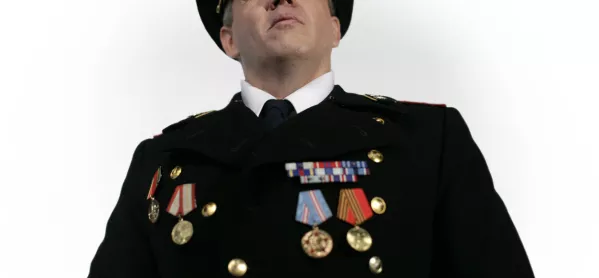The Army, it appears, is to be drafted into schools next term, to help set up a mass Covid testing regime.
Leaving aside “What the hell is going on?”, there are a number of other tricky questions that start to emerge concerning the Army’s arrival into schools in January…
Coronavirus: Bringing the Army into schools
1. Who holds rank over whom?
No one seems to have even considered this trickiest of questions. With two formal hierarchies suddenly working alongside each other, teachers at all levels need to know the new blended order of seniority.
Can the head of geography tell a sergeant-major to bring her a cup of tea, or would that be a regrettable mistake? Does a lance-corporal have authority to tell an English teacher what to do? (Good luck with that, anyone.)
So, to avoid any such embarrassment at the start of next term, I’ve had a quick think and sorted it all out here. First, let’s deal with the officer/senior leadership rankings, from the top down:
- Headteacher
- Major general
- Site supervisor
- Deputy headteacher
- Brigadier
- Bloke who runs the school bus company
- Assistant headteacher
- Colonel
Then, for the “soldier” rankings, the order in the field should go:
- Head of school kitchen
- Year head
- Major
- Department head
- Captain
- Second in department
- Lieutenant
- History teacher
- Corporal
- Geography teacher (and so on, down to the lesser subjects)
- Lance-corporal
- NQT
- Private
- Ella in Year 11
- Alfie in Year 10
- Officer cadet
- Student teacher
I know that not everyone in teaching (or in the Army for that matter) is going to enjoy that ranking, but they are just going to have to deal with it. Clarity, not fairness, is the one thing everyone needs at the moment.
Talking of which…
2. Whose rules to follow?
This is another area where it could get ugly unless teachers and soldiers are all, literally, following the same rulebook.
While behaviour management in the Army may have moved on a bit in recent decades, there is still a vast cultural divide compared with the approach taken in schools.
Hearing from someone who joined the armed services quite recently (who rarely got through a kit inspection without having his boots and socks tossed repeatedly into a distant hedge for him to retrieve), I can confirm that the notion of positive reinforcement has still to take a firm hold there.
Despite the popular call in some quarters for schools to get ex-soldiers in to instil more “army discipline”, I cannot envisage too many parents and children welcoming the full transfer to Army ways. Yet it would undermine the Army for their systems to be ignored completely.
Any kind of mixing and fudging of the two rulebooks is plainly not going to work. Instead, surely the best option is for there to be a clearly stated time-division for each day that the Army is in.
So: school rules to apply before midday. Army rules afterwards.
3. And what is actually going to happen?
Sorry, I am not sure on this one yet. Anyway, any answer I give here will probably be out of date by the time you read this, and even more out of date a day or two after that. Follow more serious parts of Tes to try to keep up with this one.
Instead, as with everything else that we and many others confront at the moment, I just wish everyone the very best of luck and the happiest possible new year.
Stephen Petty is head of humanities at Lord Williams’s School in Thame, Oxfordshire
